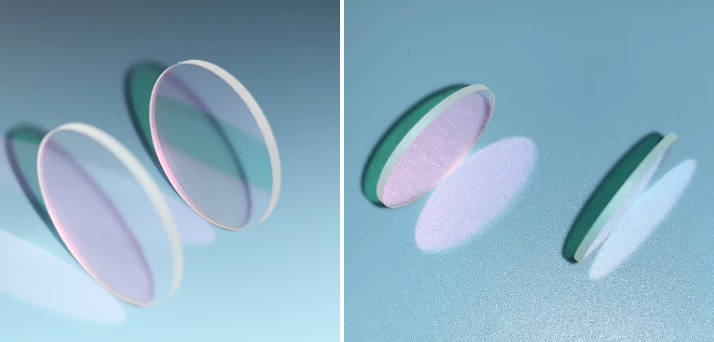ISO9001 Certified Professional Manufacturer & Supplier of Optics
+86-0431-87911611 admin@ytoptics.com
Contact us
-
 Email: admin@ytoptics.com
Email: admin@ytoptics.com
-
 Tel:86-0431-87911611
Tel:86-0431-87911611
-
 Add: 2# Automotive Innovation
Add: 2# Automotive Innovation
Jilin Province, China
Changchun Yutai Optics Co., Ltd.
Technical Principles and Application Prospects of Infrared Filters
Infrared filters are essential optical components that selectively transmit or block specific wavelengths of infrared light. With the rapid development of infrared technology, IR filters are increasingly used in military, medical, and industrial detection applications.


Technical Principles of Infrared Filters
The working principle of IR filters is based on the absorption, reflection, or interference effects of materials on specific infrared wavelengths. When infrared light strikes the filter surface, certain wavelengths are selectively transmitted while others are blocked or reflected. This selective transmission enables spectral separation and signal extraction.
From a physical perspective, the functionality of IR filters depends on the energy band structure and optical properties of materials. The bandgap of semiconductor materials determines their infrared absorption characteristics, while the interference effects of multilayer dielectric films enable efficient reflection of specific wavelengths. By precisely controlling material composition and structure, IR filters with customized transmission properties can be designed.
Main Types of Infrared Filters
Based on their working principles and structural features, IR filters can be classified into three main types: absorption, reflection, and interference filters.
Absorption filters utilize the absorption properties of materials (such as doped semiconductors or organic compounds) to filter specific wavelengths. These filters are simple in structure and cost-effective but offer relatively lower selectivity.
Reflection filters employ multilayer dielectric films to reflect unwanted wavelengths, providing high wavelength selectivity and transmittance.
Interference filters rely on optical interference effects, where precise control of film thickness allows selective transmission of target wavelengths. These filters exhibit superior performance but require complex manufacturing processes and higher costs.
Application Prospects of Infrared Filters
IR filters have significant applications across multiple fields:
Thermal imaging: IR filters separate different infrared bands to enhance image quality and temperature measurement accuracy.
Spectral analysis: They serve as key components in detecting material compositions.
Photoelectric detection: IR filters suppress background noise, improving signal-to-noise ratios in sensing systems.
With advancements in material science and optical technology, IR filters are evolving toward higher performance, miniaturization, and intelligence. Emerging nanomaterials and metasurface technologies present new opportunities for IR filter development. In the future, they will play an increasingly important role in environmental monitoring, biomedicine, autonomous vehicles, and other cutting-edge applications.
As a critical optical component, IR filters warrant in-depth research into their technical principles and application potential. With ongoing technological progress, IR filters will demonstrate greater value in various industries.
The working principle of IR filters is based on the absorption, reflection, or interference effects of materials on specific infrared wavelengths. When infrared light strikes the filter surface, certain wavelengths are selectively transmitted while others are blocked or reflected. This selective transmission enables spectral separation and signal extraction.
From a physical perspective, the functionality of IR filters depends on the energy band structure and optical properties of materials. The bandgap of semiconductor materials determines their infrared absorption characteristics, while the interference effects of multilayer dielectric films enable efficient reflection of specific wavelengths. By precisely controlling material composition and structure, IR filters with customized transmission properties can be designed.
Main Types of Infrared Filters
Based on their working principles and structural features, IR filters can be classified into three main types: absorption, reflection, and interference filters.
Absorption filters utilize the absorption properties of materials (such as doped semiconductors or organic compounds) to filter specific wavelengths. These filters are simple in structure and cost-effective but offer relatively lower selectivity.
Reflection filters employ multilayer dielectric films to reflect unwanted wavelengths, providing high wavelength selectivity and transmittance.
Interference filters rely on optical interference effects, where precise control of film thickness allows selective transmission of target wavelengths. These filters exhibit superior performance but require complex manufacturing processes and higher costs.
Application Prospects of Infrared Filters
IR filters have significant applications across multiple fields:
Thermal imaging: IR filters separate different infrared bands to enhance image quality and temperature measurement accuracy.
Spectral analysis: They serve as key components in detecting material compositions.
Photoelectric detection: IR filters suppress background noise, improving signal-to-noise ratios in sensing systems.
With advancements in material science and optical technology, IR filters are evolving toward higher performance, miniaturization, and intelligence. Emerging nanomaterials and metasurface technologies present new opportunities for IR filter development. In the future, they will play an increasingly important role in environmental monitoring, biomedicine, autonomous vehicles, and other cutting-edge applications.
As a critical optical component, IR filters warrant in-depth research into their technical principles and application potential. With ongoing technological progress, IR filters will demonstrate greater value in various industries.
PREV : Yutai Optics 一Optical Domes NEXT : LASER World of PHOTONICS 2025

TALK TO US 86-0431-87911611
86-0431-87911611
Call us now!
 86-0431-87911611
86-0431-87911611Call us now!
ONLINE CHAT
 2433808388
2433808388

